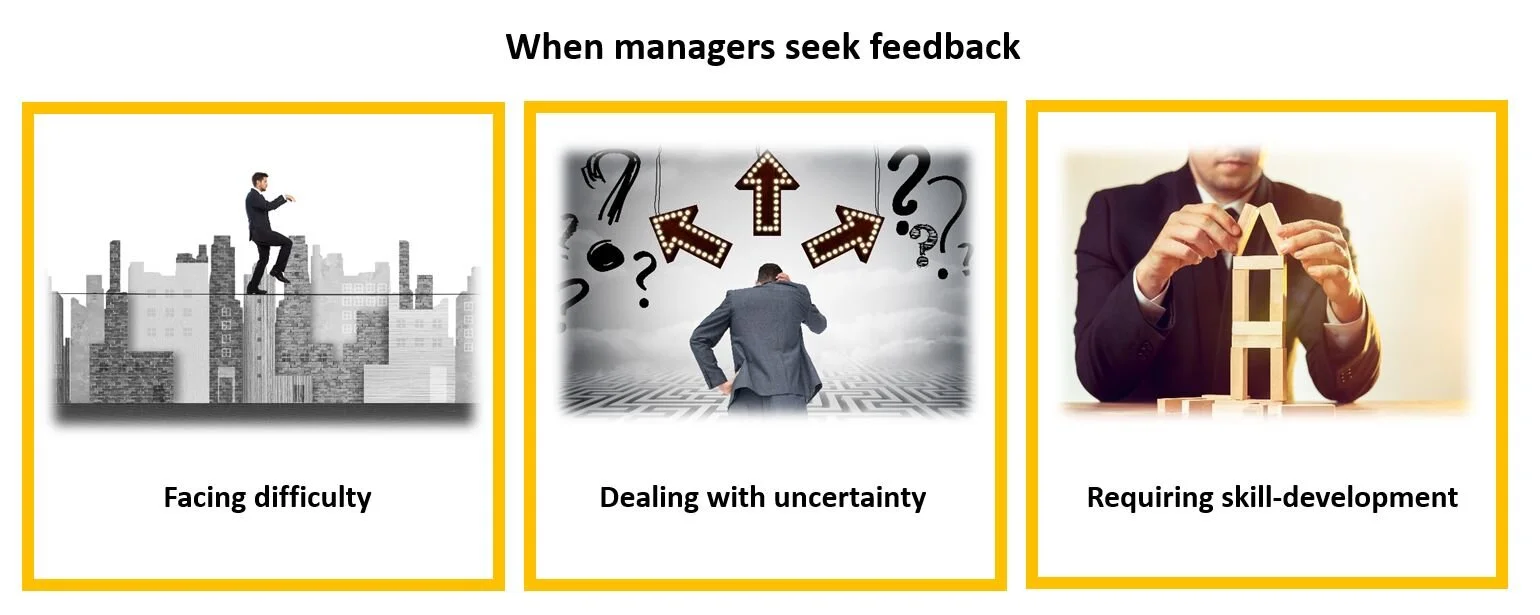Digest 24. When, why and from whom managers seek feedback
Most organizations are focused on employees’ performance and encouraging them to seek feedback to meet their goals and further improve their performance (see Digest 23 for more information). This is while less attention has been paid to managers and their feedback seeking behaviors. Managers are expected to be competent across a wide range of social and interpersonal tasks and they too face uncertainties. Hence, in principle, managers could be thought of largely benefiting from actively seeking feedback to assess and increase their competences and reduce uncertainty. However, they may find feedback seeking tricky, probably thinking that it would damage their image as a competent and confident person and therefore, affect their ego. Unfortunately, these thoughts would most likely prevent managers from asking for honest feedback. So, what situations can facilitate managers’ feedback seeking?
When, why, and from whom do managers seek feedback?
To answer these questions, Millward, Asumeng, and McDowall (2010) conducted interviews with ten managers from private and public organizations in the UK. To conduct the first round of interviews, Millward and colleagues (2010) used a technique called repertory grid where managers were asked to 1) list the managerial functions (e.g., client interaction, supervision, time management) where they would (and would not) actively seek feedback from others, also giving the reasons for seeking or not seeking feedback; 2) describe the qualities that differentiate and assimilate these managerial functions; and 3) link functions with qualities in a grid/matrix format. A second round of interviews asked managers to reflect on the person to whom they would/would not turn for feedback across the different situations in their grid, and to explain their choices.
Based on their analyses, Millward and colleagues found that managers seek feedback when a) they perceive uncertainty; b) they face difficulty in fulfilling their functions; c) reaching organizational goals requires skill or self-development. Uncertainty was described as when managers are unsure about having appropriate knowledge and skills or about the right approach to undertake to complete a task. Managers were particularly likely to seek feedback when unsure about their perceptions, understanding, and judgment (i.e., in cognition-related functions). For example, they tended to ask for feedback in relation to client interaction to validate their assessment or in relation to team management to understand their effectiveness. According to managers, difficulties arise in functions which are complex (with no obvious outcome), involve multiple skills, need creativity, and require delicate judgment and decision making; and it is in such functions that they would seek feedback. Examples of such difficult functions were staff coaching and client assessment. Finally, if feedback is perceived as a means to develop their skills and competences and improve performance, most probably managers will go for it. For instance, they would want information on their appraisal, leadership and communication skills.
Moreover, the analyses showed that managers avoid seeking feedback from their colleagues, employees or any local sources. Rather, they usually turn to credible and more distant sources (mostly outside the organization, such as friends, mentors or counselors) who can provide useful and impartial information or opinion. Remote sources are chosen by managers to reduce the risk of any damage to their image or ego.
Organizational implications
In order to promote feedback seeking behavior among managers, organizations are encouraged to:
Create a feedback environment that enhances learning and collaboration instead of performance and competition. This can be achieved by avoiding interpersonal comparisons and intolerance of mistakes.
Design performance management and feedback systems that encourage behaviors rather than comparisons (check out Digest 14 for more information), and that focus on developmental aspects rather than mere evaluations.
Create a psychologically safe environment filled with mutual trust where managers and employees can seek feedback safely without feeling insecure or afraid to appear incompetent.
Provide coaches and mentors whom managers can go to for feedback when they face difficulties and uncertainties.
Put in place active training and development practices helping managers develop the skills they need.
——
Reference: Millward, L. J., Asumeng, M., & McDowall, A. (2010). “Catch me if you can?”: A psychological analysis of managers’ feedback seeking. Journal of Managerial Psychology, 25(4): 384–407. https://doi.org/10.1108/02683941011035296

